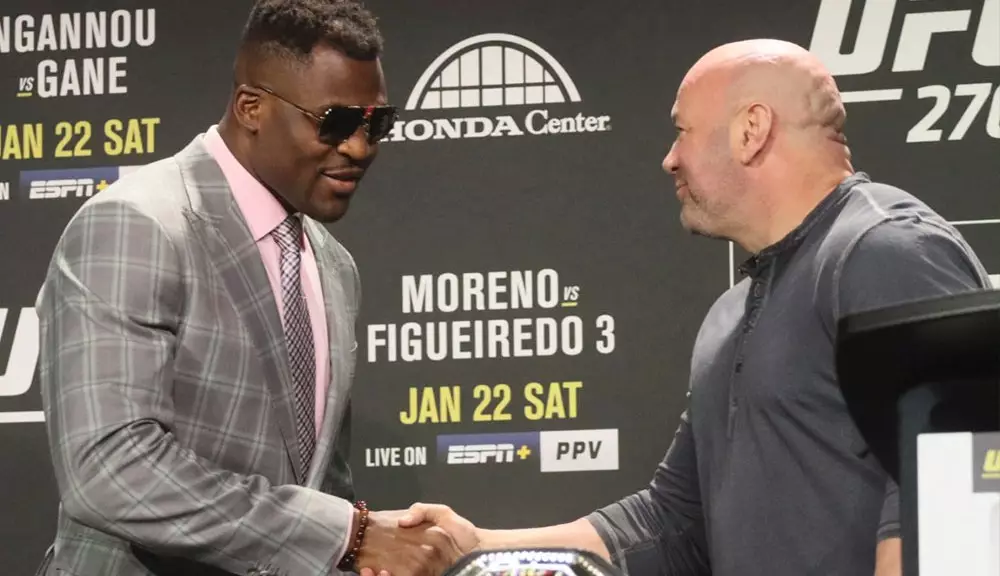The mixed martial arts (MMA) world has never been a stranger to conflict, both inside the cage and out. A compelling narrative has emerged from the turbulent relationship between Francis Ngannou, the former UFC heavyweight champion, and Dana White, the UFC CEO. Their feud, characterized by sharp public statements and a divergence of paths, exemplifies the adage that in every conflict, there are two sides—and often, a messy reality lies somewhere in the middle. As Ngannou transitioned from the UFC to the Professional Fighters League (PFL), he did so amid a wave of criticisms and dismissals from White, who has historically maintained a tight grip on the narrative surrounding his fighters.
Ngannou’s exit from the UFC, ignited by contract disputes, left a vacuum filled with speculation. White has claimed that Ngannou shunned a potential fight against Jon Jones, subtly portraying him as lacking the courage expected of a champion. This assertion starkly contrasts with White’s earlier admiration for Ngannou as “the baddest man on the planet.” Such contradictions bring into question the sincerity of White’s past praises and reveal a pattern of using narrative to sculpt the space around fighters in his organization.
The narrative surrounding Ngannou has inevitably changed since he left the UFC. He has tasted both victory and defeat in the boxing ring, facing giants such as Tyson Fury and Anthony Joshua—both losses that White has eagerly highlighted in disparagement. Interestingly, these defeats are juxtaposed against Ngannou’s impressive debut performance in the PFL, where he delivered a swift victory against a top opponent. The juxtaposition of Ngannou’s brilliance in the PFL against his struggles in boxing provides a nuanced look at an athlete still very much in pursuit of defining his legacy.
White’s assessment of Ngannou draws on a memorable, yet poorly received, fight against Derrick Lewis in 2018—an encounter that has since been criticized as one of the dullest heavyweight bouts in UFC history. By spotlighting this specific fight, White aims not only to cast shadows over Ngannou’s more illustrious victories but also to suggest that Ngannou’s tenure in the UFC was marked more by underwhelming performances than by his potential. This perspective underscores the complicated relationship between fight promotion and the realities of athletic performance.
At the heart of the conflict lies deeper implications about character and professionalism. White’s dismissal of Ngannou as an athlete extends beyond mere statistics; it is deeply intertwined with his judgment of Ngannou’s character. In recent interviews, White suggested that Ngannou’s demeanor and conduct made him an unsuitable partner for the UFC’s business approach. The implications of such character assessments in combat sports raise significant questions. Should performance alone determine a fighter’s worth in a promotion, or do personal qualities also play an essential role?
White’s statements hint at an emotional element that complicates the business ethos typically associated with sports promotions. They reflect a personal vendetta meriting scrutiny and raise questions about how personal biases may shape the professional landscape of MMA. The implications of favoritism or prejudice can have lasting impacts on fighters, both in terms of opportunities available to them and their public perceptions.
The reality is that as Ngannou continues to forge his path in the PFL, these ongoing tensions with White and the UFC will shape his narrative, regardless of his achievements. While White has suggested that he holds no animosity towards Ngannou on a professional level, the fact remains that the two are unlikely to mend fences in the foreseeable future. As White has stated, “We’ll never be in business together again,” cementing what appears to be an irrevocable rift.
However, this fracture in their relationship may ultimately yield consequences beyond their personal feud. The dynamics of the MMA scene are evolving, with new promotions like the PFL emerging to challenge the UFC’s long-held supremacy. Fighters are increasingly considering broader horizons, spurred by their individual quests for autonomy. Ngannou’s pursuit of success outside the UFC may very well inspire other fighters to explore their options, contributing to a more diverse landscape where personal value is equally important.
As the MMA saga of Francis Ngannou and Dana White unfolds, we are reminded of the complex interplay between personal relationships and professional realities. The sport is not merely a battleground of physical prowess—it’s a stage for conflicting narratives, underlying emotions, and evolving identities. The rift exemplified by Ngannou and White will resonate throughout the sport, echoing the multifaceted nature of human interactions within the fiercely competitive arena of MMA. The fight is no longer just inside the cage; it has morphed into a wider commentary on personal redemption and professional integrity, shaping how we perceive fighters and their journeys.

